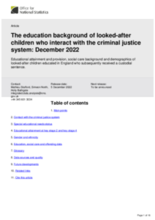Demographic Data:
|
Sources: World Bank, UNDP, DHS 2010-11 |
Displaying 1151 - 1160 of 14347
This analysis conducted by the UK Office for National Statistics explores the education and social care background of care-experienced young people in England who were imprisoned at any point up to the age of 24 years.
Children in care are 10 times more likely to end up in prison by the time they reach 24 than those who grew up outside the system, official figures suggest. The study by the Office for National Statistics (ONS) published today found that looked-after children were more at risk of coming into contact with the criminal justice system during early adulthood than their peers.
Human rights experts in a Harvard Law School panel on Wednesday discussed how the United Nations has responded to violations of children's rights during global armed conflict. The panelists examined the UN’s attempts to hold governments and non-state actors accountable for rights violations.
Department for Education’s (DfE) statistics on looked-after children in England, released earlier this month, showed the number of unaccompanied children in care grew by 1,430 in the year to March 2022, surpassing the overall increase of 1,390 in the care population. The latter rose for the 14th consecutive year, by 2%, to 82,170.
Queensland child safety authorities have quietly ditched a "racially biased" decision-making tool that had been widely used for years. The move came on the back of preliminary findings from a Queensland expert comparing the tool's accuracy across Indigenous and non-Indigenous children. The tool, known as the Structured Decision Making model, was used to rate children on their risk of harm and help authorities decide whether to intervene.
Olena Merzliakova, a psychologist and Ph.D. in Psychology, shared effective and simple tips for parents. She is one of the experts engaged for the EU-funded hotline established this summer by the UNDP.
Linking adoption to abortion so casually, with no further elaboration, reveals a particular view of the world. The logic seems so clear: Lots of parents want to adopt babies, the babies who will no longer be aborted could be those babies. Two incredibly complex social issues, one easy almost-beautifully reductive solution. But of course, the reality isn’t so simple.
On 25 September 2022, a referendum was held in Cuba to approve the Family Code 2022. The historic new legislation, which is widely celebrated as one of the “most progressive codes of families”, provides important, strengthened measures for the protection of children and adolescents across the country.
The latest Family Matters report released by the Secretariat of National Aboriginal and Islander Child Care, an Australian non-governmental peak body for Aboriginal and Torres Strait Islander children – reveals that there are there more than 22,000 Aboriginal and Torres Strait Islander children in out-of-home care.
No part of Scotland was “immune” to abuse of children in foster care over more than eight decades, an inquiry has heard. The Scottish Child Abuse Inquiry (SCAI) has been told of physical, sexual, psychological and emotional abuse, neglect and exploitation since public hearings for the foster care case study opened in May.

